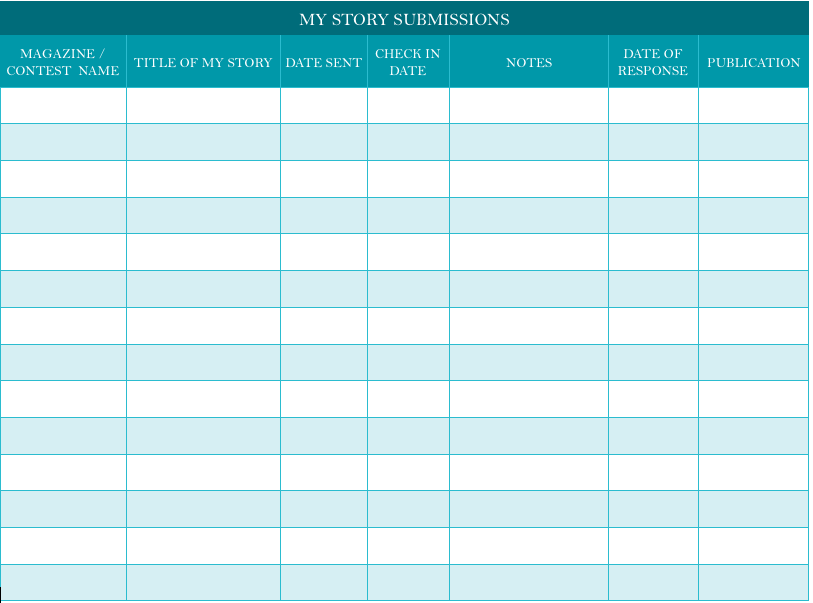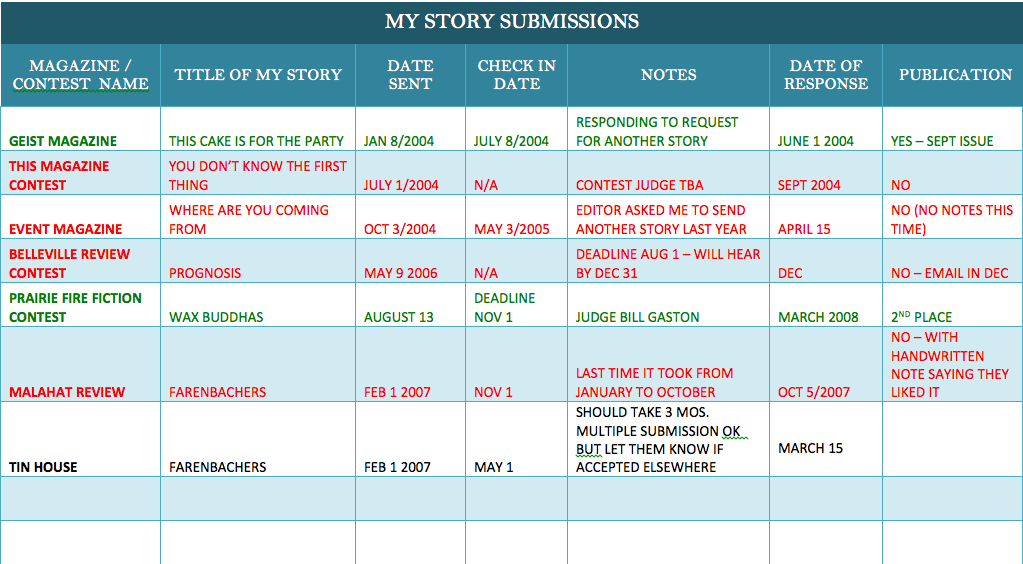How do you keep track of your submissions?

So you entered a short story contest this summer. It was a brand new story and you wrote it just for the contest. The deadline gave you a rush of adrenaline/inspiration – you took advantage of that, and sent it in last week.
When will you hear news about the finalists? In September?
Meanwhile, you sent that other story out – the one you’ve been working on for months – that one went out at the beginning of April. Check. The journal website says they typically respond in about 6 months.
Do they take a reading break for summer? So 6 months after August, maybe?
In the mailbox today: a self-addressed envelope, in your handwriting, with that nice stamp you chose. You open it. A note from the editor of another magazine, apologizing for the delayed response to your submission. She liked your story, but it’s not the right fit. Do you have anything else for her?
She didn’t name the title of your story in the letter. When did you submit to that magazine? The editor apologized for the delayed response – did you send a story out last winter? Which story was it again?
You can see where this is going.
It’s really time to get out of the habit of keeping all of your submission details in your head.
If you aren’t a prolific writer and you’re just starting to submit your work to journals and contests, it might seem superfluous to keep a tracking log. You only have a couple of stories, anyway, right? Why do you have to write all of these details down? I'll tell you why.
IT CLEARS CLUTTER.
Keeping submission details in your head is energy-wasting mental clutter. Clear space in your brain and you encourage creative clarity and focus. Even if you only have a few polished stories so far, keeping track of your submissions will create a reality for your soon-to-be published stories, and it will create space for your new writing.
IT STRENGTHENS YOUR AMBITION.
Keeping everything in your head is a sign to yourself that you’re only ever going to have a small number of stories published. How could you ever write and publish 10 stories in different international magazines, if you can only keep track of 3 or 4 in your head at one time?
IT’S PROFESSIONAL.
Respect your work and make way for your success. Being disorganized with your submissions shows your writing that you don’t really take it seriously. Your stories deserve to be treated professionally: show them that you’re ready.
IT’S A COMFORT.
Before my book came out, I’d submit about 3 - 4 different stories at a time. Still, there were some long months where I’d hear nothing about my submissions. That’s when I would consult my Submissions Tracking document, just to look at it. It gave me a certain comfort – not only did it prove that I was working on my stories, it showed me that I’d been working consistently. I was doing right by them.
And all of my green “YES” lines were still in there, shining out from the reds and the blacks. I could see that my stories had found homes. I could also see that they had been submitted over and over before they’d been accepted. That was a nice reminder.
ARE YOU CONVINCED?
Yay! Okay. To make your life easier, I made you your very own beautiful and functional Story Submissions Tracking template. Please download it and start using it today, with my best wishes.
DOWNLOAD HERE (Click image below):
HOW TO USE IT
It’s pretty self-explanatory, but here’s an example so you can see what sort of information you should be recording. Note: I like to use colours in my document – green for “YES” and red for “NO”– that way I can see patterns at a glance, and evaluate them. This also makes unresolved submissions easy to find – they’re the ones in black. For example, these are some of my actual submission notes from my pre-Cake days:
If you’ve already been keeping track of your submissions – good for you! In that case, I hope the above snapshot is reassuring – there are WAY more reds than greens on my document, as you can see. (And this is just an excerpt! You should see the whole thing.)
Now it's your turn. Onward!
xo,




9 comments
Leave a comment